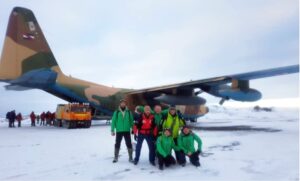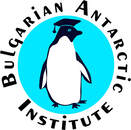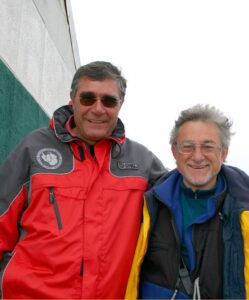 Six Bulgarian polar explorers: Yordan Todorov, Petar Sapundzhiev, Emil Ivanov, Nikolay Nikolov
Six Bulgarian polar explorers: Yordan Todorov, Petar Sapundzhiev, Emil Ivanov, Nikolay Nikolov
, Kamen Nedkov and the doctor Dr. Atanas Peltekov, after about a month of delay, on April 14 2021, left the Antarctic region and, by a Uruguayan
military plane arrived in the southernmost Chilean city of Punta Arenas.
The adventure of the 29th Bulgarian Antarctic Expedition started late due to a sequence of facts: The Spanish ship Esperides, which was scheduled to arrive at Livingston Island, did not sail from Spain at all, due to cases of Covid-19 of some of the crew. After twenty days of strict quarantine in Punta Arenas (each of the six Bulgarian guys was alone in a hotel room with food delivered to the door), the other Spanish ship, the Sarmiento de Gamboa, carried the group before the closure of the Spanish Base Juan Carlos I (WAP ESP-Ø1). The Chilean icebreaker Aquilez, which was scheduled to carry the Bulgarians from Livingstone Island at the end of March, was also quarantined due to Covid testing positive for some of the crew.
At the end of the season, before the onset of polar winter, there were practically no ships in the area of the South Shetland Islands. Prof. Pimpirev (doyen of the Bulgarian Antarctic Program) made contact with the Chilean Antarctic Institute, the polar ship Lautaro went to take the group, threatened them with hibernation, without supplies of food and fuel, to the largest island in the area, King George, where there are several year-round bases and an airport. “Despite logistical problems, the expedition was able to complete all planned activities. Damage to facilities and buildings on the base caused by high winds during the time when no one was on the base was repaired and it was conserved for the coming winter. The site was prepared for the construction of the new laboratory block, a special hangar was built for the incinerator, which burns the waste ecologically, and all the data were taken from the year-round scientific equipment, which records climatic, seismic, mareographic and glaciological events, in the area when the base is not inhabited” said Prof. Dr. Hristo Pimpirev, head of all Bulgarian polar expeditions and director of the Bulgarian Antarctic Institute.
activities. Damage to facilities and buildings on the base caused by high winds during the time when no one was on the base was repaired and it was conserved for the coming winter. The site was prepared for the construction of the new laboratory block, a special hangar was built for the incinerator, which burns the waste ecologically, and all the data were taken from the year-round scientific equipment, which records climatic, seismic, mareographic and glaciological events, in the area when the base is not inhabited” said Prof. Dr. Hristo Pimpirev, head of all Bulgarian polar expeditions and director of the Bulgarian Antarctic Institute.
In Punta Arenas the polar explorers have not been under quarantine, their return to Bulgaria is expected on April 19.
 Prof. Hristo Pimpirev, together with Javier Cacho, a Spanish scientist physicist , recently received the “Unifier of Cultures” award in the eighth “Worlds and Colors” contest, organized by the Association of Spanish speaking Journalists in Bulgaria. (pic to the left)
Prof. Hristo Pimpirev, together with Javier Cacho, a Spanish scientist physicist , recently received the “Unifier of Cultures” award in the eighth “Worlds and Colors” contest, organized by the Association of Spanish speaking Journalists in Bulgaria. (pic to the left)
Javier Cacho is one of the first researchers of the ozone hole. He was the base commander of the Spanish polar Station “Juan Carlos I” on Livingston island. He is also a famous writer and several of his Antarctica books have been translated into Bulgarian. The “Worlds and Colours” awards are given to journalists, artists and intellectuals for their overall contribution to the rapprochement between the cultures of Bulgaria and the Spanish-speaking world. Due to the epidemiological situation, the award will be held as an online event until the end of April.
Text taken from the original article at: https://bnr.bg/hristobotev/post/101453437
TNX Dr. Volker Strecke DL8JDX
 Six explorateurs polaires bulgares : Yordan Todorov , Petar Sapundzhiev , Emil Ivanov , Nikolay Nikolov
Six explorateurs polaires bulgares : Yordan Todorov , Petar Sapundzhiev , Emil Ivanov , Nikolay Nikolov
, Kamen Nedkov et le médecin Dr. Atanas Peltekov , après environ un mois de retard, le 14 avril 2021, a quitté la région antarctique et, par un uruguayen
un avion militaire est arrivé dans la ville chilienne la plus au sud de Punta Arenas.
L’aventure de la 29 e expédition antarctique bulgare a commencé tard en raison d’une séquence de faits: le navire S panish Esperides , qui était programmé
ed pour arriver à Livingston Island, n’a pas du tout navigué d’Espagne, en raison de cas de Covid-19 de certains membres de l’équipage. Après vingt jours de quarantaine stricte à Punta Arenas (chacun des six Bulgari
un gars était seul dans une chambre d’hôtel avec de la nourriture livrée à la porte), l’autre navire espagnol , le Sarmiento de Gamboa, a transporté le groupe avant la fermeture de
la Base espagnole Juan Carlos I (WAP ESP-Ø1). Le brise-glace chilien Aquilez , qui devait transporter les Bulgares de l’île de Livingstone à la fin
de mars, a également été mis en quarantaine en raison du test positif de Covid pour certains membres de l’équipage.
À la fin de la saison, avant le début de l’hiver polaire, il n’y avait pratiquement pas de navires dans la région des îles Shetland du Sud. Prof. Pimpirev (doyen de l’Antarctique bulgare
Programme) a pris contact avec l’Institut antarctique chilien, le navire polaire Lautaro est allé prendre le groupe, les a menacés d’hibernation, sans approvisionnement en nourriture et en carburant, au plus grand
île de la région, King George, où il y a plusieurs bases à l’année et un aéroport. «Malgré des problèmes logistiques, l’expédition a pu mener à bien tous les  Activités. Dommages
Activités. Dommages
les installations et les bâtiments de la base causés par des vents violents à l’époque où personne ne se trouvait sur la base ont été réparés et conservés pour l’hiver à venir. Le site a été préparé pour la
construction du nouveau bloc de laboratoire, un hangar spécial a été construit pour l’incinérateur, qui brûle les déchets de manière écologique, et toutes les données ont été prises à
équipement, qui enregistre les événements climatiques, sismiques, maréographiques et glaciologiques, dans la zone où la base n’est pas habitée » a déclaré Prof. Dr Hristo Pimpirev ,
chef de toutes les expéditions polaires bulgares et directeur de l ‘ Institut bulgare antarctique.
A Punta Arenas les explorateurs polaires n’ont pas été mis en quarantaine, leur retour en Bulgarie est attendu le 19 avril.

Le professeur Hristo Pimpirev , avec Javier Cacho , un physicien scientifique espagnol, a récemment reçu le prix «Unifier of Cultures» lors de la huitième
Concours «Mondes et couleurs», organisé par l’Association des journalistes hispanophones de Bulgarie. ( photo à gauche )
Javier Cacho est l’un des premiers chercheurs du trou d’ozone. Il était le commandant de la base de la station polaire espagnole «Juan Carlos I» sur
Île Livingston. Il est également un écrivain célèbre et plusieurs de ses livres sur l’Antarctique ont été traduits en bulgare. Les prix «Mondes et couleurs» sont décernés aux journalistes,
artistes et intellectuels pour leur contribution globale au rapprochement entre les cultures bulgares et hispanophones. En raison de la situation épidémiologique, le prix
se tiendra en tant qu’événement en ligne jusqu’à la fin du mois d’avril.
Texte tiré de l’article original sur : https://bnr.bg/hristobotev/post/101453437
Merci Dr. Volker Strecke DL8JDX
Info de la Source Publié * ICI
